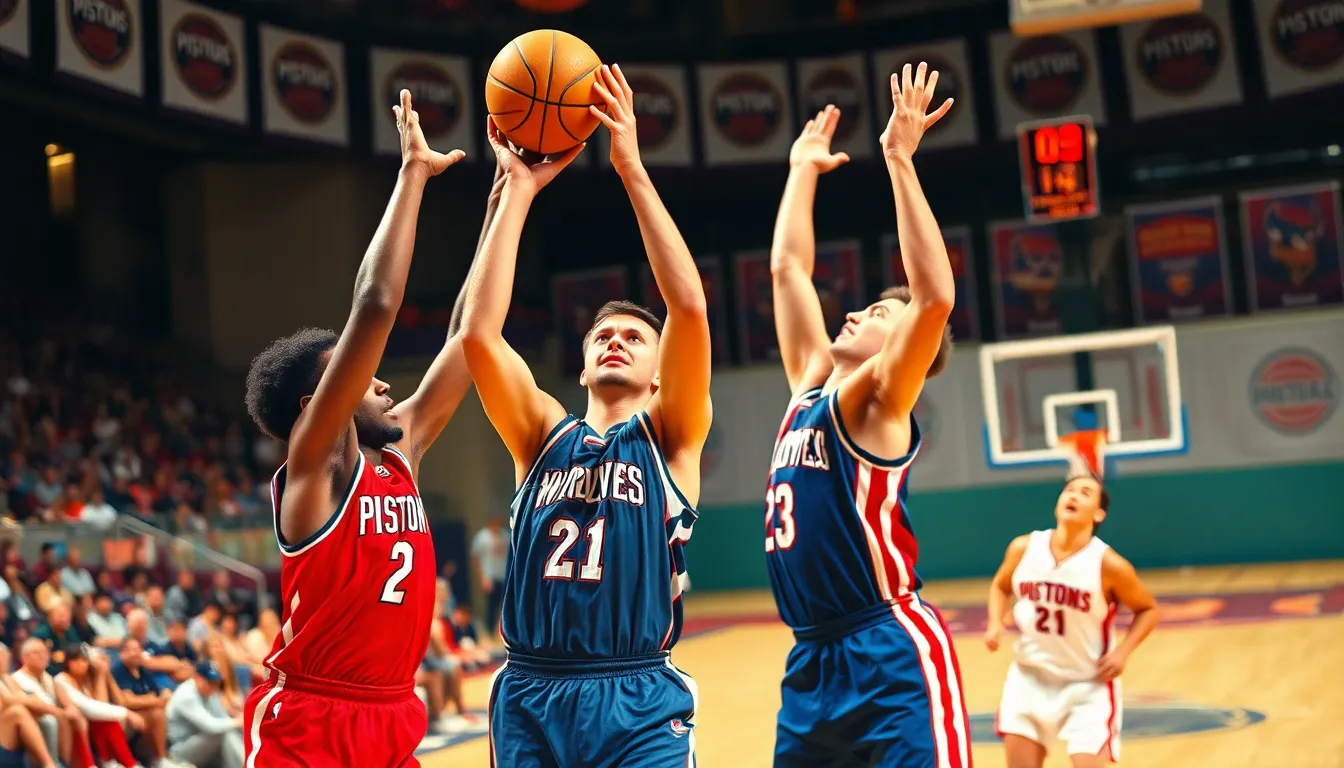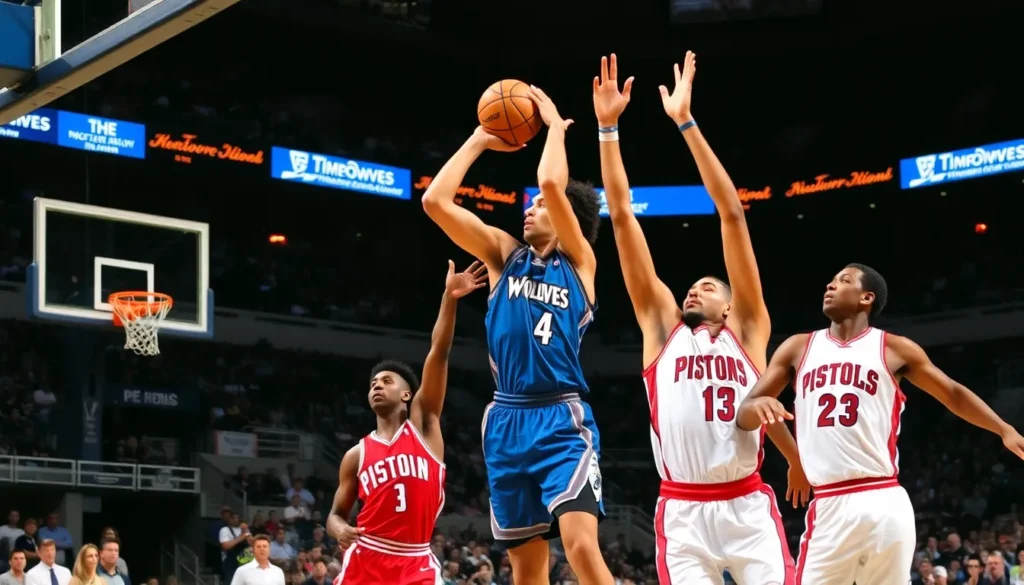When the Timberwolves and the Detroit Pistons clash on the court, fans experience a thrilling showdown that’s more than just a game. It’s a battle of stats, skills, and maybe a little bit of luck. Whether you’re a die-hard fan or a casual observer, understanding the numbers behind these teams can be as exhilarating as the final buzzer.
Table of Contents
ToggleOverview of Timberwolves vs Detroit Pistons
The matchup between the Timberwolves and the Detroit Pistons showcases two distinct NBA teams, each with unique strengths and weaknesses. Timberwolves’ offensive strategy often relies on their star players’ abilities to score from multiple areas, while the Pistons focus on solid defense and teamwork.
Statistically, the Timberwolves excel in three-point shooting, ranking among the top teams in the league. Their average points per game typically hover around 115, highlighting their capacity to generate high-scoring games. In contrast, the Pistons usually maintain a lower points-per-game average, around 108, indicating their emphasis on defensive plays.
Rebounding remains a crucial aspect of both teams’ strategies. The Timberwolves often dominate on the boards, averaging about 48 rebounds per game. The Pistons, while not far behind, average around 45 rebounds per game, making this a critical area of competition during matchups.
Player performance statistics also play a vital role in these encounters. For example, the Timberwolves often feature key players with high assist-to-turnover ratios, enhancing ball control. On the other hand, the Pistons rely on their bench depth, frequently bringing in role players who can shift the momentum a game.
Head-to-head matchups between these teams indicate competitive tension. Historical data reveals closely contested games, with point differentials often falling within single digits. As both teams strive for improvement, each game becomes an opportunity to analyze their evolving dynamics and performance statistics.
Team Performance Comparison

The Timberwolves and the Detroit Pistons each present distinctive performance metrics that define their styles of play.
Recent Game Stats
In their latest matchup, the Timberwolves secured a tight victory, scoring 120 points while the Pistons managed 115. The Timberwolves showcased strong shooting efficiency with 47% from the field and 39% from three-point range. This performance included key contributions from their starters who combined for 85 points. Comparatively, the Pistons relied on a balanced attack, with four players scoring in double digits, but struggled with turnovers, committing 18 throughout the game. Their shooting percentage was slightly lower at 44%, illustrating the need for improvement in offensive execution.
Season Averages
Throughout the season, the Timberwolves average 115 points per game, reflecting their strong offensive capabilities. They excel in three-point shooting, hitting 38% of attempts. Their rebounding prowess stands out, averaging 48 per game, contributing significantly to their performance. Conversely, the Pistons fall short with an average of 108 points per game. They focus on defense, allowing just 110 points from opponents. The Pistons’ bench depth provides solid support, resulting in an average of 35 points per game from substitutes. Both teams exhibit unique strengths that shape their competitive landscape.
Key Player Statistics
Player statistics play a crucial role in understanding the matchup dynamics between the Timberwolves and the Pistons. Each player’s performance can significantly impact the game’s outcome.
Timberwolves Players to Watch
Anthony Edwards leads the Timberwolves, demonstrating exceptional scoring ability, averaging over 24 points per game. Karl-Anthony Towns offers depth, contributing an average of 10 rebounds and 22 points weekly. D’Angelo Russell enhances the team’s playmaking, maintaining an impressive assist rate, which often translates into scoring opportunities. Jaden McDaniels adds versatility with solid defensive stats, impacting opposing players’ shooting percentages. These key players exemplify the Timberwolves’ strengths, facilitating their high-scoring game plan while ensuring a competitive edge on the court.
Pistons Players to Watch
Bojan Bogdanovic remains a critical asset for the Pistons, averaging 20 points per game while shooting effectively from three-point range. Cade Cunningham showcases his promise as a young star, contributing both points and assists, enhancing team play. Isaiah Stewart provides a robust rebounding presence, averaging close to 8 boards each game, crucial for offensive second chances. Flooding the court with teamwork, the Pistons benefit from a reliable bench, allowing role players to step up when needed. Each of these players contributes significantly to the Pistons’ defensive strategy, helping maintain their competitive standing.
Head-to-Head Matchup History
Historically, the Timberwolves and the Pistons boast an engaging rivalry marked by tight contests. The teams’ previous encounters reveal a history of close games, many remaining within single-digit point differentials. Each matchup reflects contrasting styles, with the Timberwolves’ fast-paced offensive strategies meeting the Pistons’ strong defensive approaches.
In their last meeting, the Timberwolves edged out the Pistons, scoring 120 points compared to the Pistons’ 115. Strong shooting efforts characterized the Timberwolves, achieving 47% shooting from the field and 39% from beyond the arc. Significant contributions came from their starters, demonstrating the depth of their offensive arsenal. Despite their lower overall scoring, the Pistons showcased team balance, yet turnover issues crept into their performance, leading to 18 turnovers in that game.
Statistically, the Timberwolves average 115 points per game, showcasing their effectiveness in three-point shooting. Conversely, the Pistons maintain a lower average of 108 points per game, highlighting their defensive focus and the depth of their bench. Rebounding remains pivotal, with the Timberwolves grabbing an average of 48 rebounds per game, just ahead of the Pistons at 45.
Individual player performances often dictate the outcome of these matchups. Anthony Edwards continues to lead the Timberwolves with over 24 points per game. Karl-Anthony Towns supports with an average of 10 rebounds per game alongside 22 points. On the Pistons’ side, Bojan Bogdanovic provides scoring at 20 points per game, while Cade Cunningham shows emerging talent. Each player significantly influences game dynamics, creating an evolving narrative that excites fans and analysts alike.
The Timberwolves and Pistons matchup offers a thrilling blend of offensive prowess and defensive strategy. Each game presents an opportunity to witness the evolution of both teams as they adapt and refine their play styles. With key players making significant impacts and statistical trends shaping the narrative, fans can appreciate the nuances behind the numbers.
As the rivalry continues, the close scores and competitive spirit promise exciting future encounters. Understanding the statistics enhances the viewing experience, allowing fans to engage more deeply with the game. The dynamic interplay between the Timberwolves’ scoring ability and the Pistons’ defensive tactics ensures that every matchup remains a captivating spectacle in the NBA landscape.






